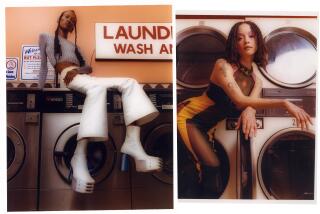Serves You Right : Today’s Department Store Clerks Could Learn a Thing or Two About Public : Relations and Good Service From a Personnel Handbook Circa 1929
- Share via
OUR TIMES ARE often described as the Age of Service, when mechanical work is done by robots and everyone is engaged in serving everyone else.
I hardly believe that this utopia has arrived, but if it has, it is less than ideal.
As Time magazine asked in a cover story several months ago: “Why is service so bad?”
“Personal service has become a maddeningly rare commodity in the American marketplace,” it noted. “Flight attendants, salesclerks and bank tellers all seem to have become too scarce and too busy to give customers much attention . . . .”
I receive many letters from readers complaining about businesses that either don’t answer their calls or put them on hold; repairmen who arrive days late; salesclerks who are busy talking on the phone to their boyfriends or girlfriends; waitresses who tell you that Debbie is going to take over while they go on their breaks (and Debbie vanishes); gas stations that don’t fix flats; stores that seem to be quite unattended; banks that have half their windows closed while long lines wait at the others.
Actually, I don’t think it’s that bad. It seems to me that most waiters and waitresses I encounter are courteous and cheerful. I have recently had a flat tire fixed in a gas station; a man from Montgomery Ward came to repair our refrigerator on the appointed day, and our guarantee paid for it; our postman is reliable.
Even so, not all of those in the service industry are as good as they used to be. I may be accused once again of looking at the past through rose-colored glasses, but I have recently discovered a document that takes me back to what must surely have been a golden age of service.
It happens to be a guide published for employees of Bullocks Wilshire when that store was opened in 1929. Bullocks Wilshire was one of the many architectural gems erected during that decade, including City Hall and the Central Library, and it stands today as one of our most beautiful structures.
I have not shopped in Bullocks Wilshire for some time, and I don’t know whether its standards of service have deteriorated or whether they are even as good as those of their contemporary competitors, but their original guide not only reminds us of what good service was like; it may also serve as a guide for all department stores today.
Bullocks Wilshire was the first department store designed to accommodate the automobile, with a parking lot at the rear. It was perhaps forgivable of them to attempt to give some elegance to this innovation by insisting that it was not to be called a parking lot.
“We say Motor Court, not parking lot,” the guide specifically advises.
Employees were also instructed to say: “We, not I; patron, not customer; and approve, not OK.”
A particularly good suggestion, it seems to me, is: “We never appear impatient.” In this day of uncivility, impatience seems to lie at the root of much evil, including freeway violence.
“We give directions graciously,” the guide says, “and, whenever possible, escort the patron at least part of the way to the next section which she wishes to visit.” (Notice the assumption that the patron would be a she.)
That is a rare service indeed. Often today, when I ask a salesperson some question like, “Where are men’s socks?” he or she will look at me as if I were an extraterrestrial.
Have you asked gas station attendants recently how to get to the nearest post office? They haven’t the slightest idea.
“We ask,” the guide says, “if we can be helpful when we see a patron who appears to be confused or to be having difficulty with packages.”
When I have difficulty these days, no one notices. I have to wait for a salesperson to come within hailing distance and then say, “Hey, I’m having some difficulty here.”
More often than not they will say, “This is not my department,” and glide away.
Of course this is only to be expected in the big self-service emporiums where you find what you want and take it to the checkout counter. Serve yourself; save money. Most of us seem to prefer economy to the personal service characterized by the Bullocks Wilshire guide.
Bullocks Wilshire wanted to make friends: “Even if we are unable to supply our patron’s requirements, we can make a friend, and Bullocks Wilshire appreciates its friends . . . . We step aside politely to permit our patrons to enter and leave the elevator before us.”
The guide instructs employees to greet each patron with “Good morning,” “Good afternoon” or “Is someone assisting you?”
I cannot say that I was a big customer of Bullock’s in the 1930s, but I often used to walk through the downtown store at 7th and Broadway. There was an entrance at the alley that went right into cosmetics, and I used to go in just for the aromatic experience. All the young saleswomen seemed as glamorous as Carole Lombard, and the place smelled like an Ottoman harem, or what I imagined an Ottoman harem smelled like.
None of these gorgeous women ever said “Good morning” or “Good afternoon” or “Is someone assisting you?” to me, but perhaps that was because I must have looked like what I was--an impoverished adolescent living out a fantasy.
By the way, all the saleswomen wore white gloves.
That was service.
More to Read
Sign up for The Wild
We’ll help you find the best places to hike, bike and run, as well as the perfect silent spots for meditation and yoga.
You may occasionally receive promotional content from the Los Angeles Times.






